

Does marijuana use really cause psychotic disorders? Does marijuana cause psychotic disorders such as schizophrenia, and do associated symptoms like paranoia lead to violent crimes?
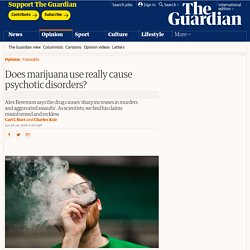
That’s what writer Alex Berenson is claiming. Does marijuana use really cause psychotic disorders? Cannabidiol - CBD - Tikun Olam USA. CBD, or cannabidiol, is the second-most-famous cannabinoid derived from the cannabis plant after, tetrahydrocannabinol aka THC.

Unlike its euphoria-inducing sister cannabinoid THC, CBD is non-psychoactive and therefore does not induce the typical “high” associated with the cannabis plant. Find Your Optimal Ratio of CBD to THC. It’s relatively easy to experience medical benefits from cannabis.

A puff or two of a resin-rich reefer can do the trick for a lot of people. But smoking marijuana is not the be-all and end-all of cannabis therapeutics. One doesn’t have to smoke marijuana or get high to experience the medical benefits of cannabis. In recent years, the advent of potent cannabis oil concentrates, non-psychotropic CBD product options, and innovative, smokeless delivery systems have transformed the therapeutic landscape and changed the national conversation about cannabis. Reefer madness makes a last-ditch comeback: Alex Berenson's anti-pot counterattack. Nationwide, marijuana legalization is becoming more normal.

Colorado’s dispensaries are hailed as an economic success story, and other states are following suit — New York Gov. Andrew Cuomo has indicated he’ll support legalization after New York City’s choice to gradually decriminalize the drug. The trend is global: Canada recently joined Uruguay in fully legalizing cannabis, and Lebanon is also mulling legalization. Marijuana legalization has always had its opponents — including the alcohol lobby, which wants to protect its monopoly on legal intoxicants, and the prison-industrial complex, which fears a decrease in the number of nonviolent drug offenders who keep jail cells full.
Now the reactionaries have another champion athwart history: former New York Times journalist Alex Berenson. Reefer madness makes a last-ditch comeback: Alex Berenson's anti-pot counterattack. Why Is CBD Everywhere? The Reasonable Way to View Marijuana’s Risks. CBD rises in popularity for pain treatment. You can sum up the latest “it” drug with three letters.
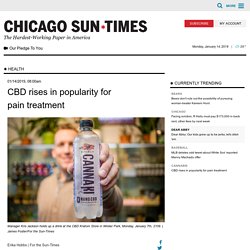
You can find it in oils, tinctures, creams and gels. It’s even in gummies. Your Facebook feed is probably filled with testimonials of people who have tried it — and if they’re like Christina Dupee, a mom of three in Park Forest, they’ll tell you it’s a game changer. “I was in shock,” said Dupee, who uses the supplement herself and on her children. The Reasonable Way to View Marijuana’s Risks. ‘Dr. Marijuana’ suspended for indiscriminately referring thousands of patients for medical weed. Anthony Anzalone once called himself “Dr.

Marijuana” and advertises as “NJGreenMD" because he was among the first physicians to participate in New Jersey’s medicinal marijuana program and claimed he referred more patients than any of his peers. On Thursday, Anzalone earned the dubious distinction of being the first doctor associated with the program to jeopardize his license, by “indiscriminately authorizing” more than 3,000 patients — including some who never would have qualified —without examining them and their medical records, Attorney General Gurbir Grewal announced. Is Marijuana as Safe as We Think? A few years ago, the National Academy of Medicine convened a panel of sixteen leading medical experts to analyze the scientific literature on cannabis.

The report they prepared, which came out in January of 2017, runs to four hundred and sixty-eight pages. It contains no bombshells or surprises, which perhaps explains why it went largely unnoticed. It simply stated, over and over again, that a drug North Americans have become enthusiastic about remains a mystery. For example, smoking pot is widely supposed to diminish the nausea associated with chemotherapy. But, the panel pointed out, “there are no good-quality randomized trials investigating this option.” Then come Chapters 5 through 13, the heart of the report, which concern marijuana’s potential risks. Cannabis in the Treatment of Dystonia, Dyskinesias, and Tics.
After marijuana edibles helped dying Holocaust survivor battle Alzheimer's, his family's foundation pushes for more research. A Massachusetts family’s experience giving marijuana edibles to their dying patriarch is set to kick off a desperately needed investigation into how cannabis might treat some of the more troubling symptoms of Alzheimer’s disease, a condition that affects 5.7 million Americans.
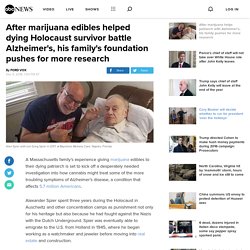
Alexander Spier spent three years during the Holocaust in Auschwitz and other concentration camps as punishment not only for his heritage but also because he had fought against the Nazis with the Dutch Underground. Spier was eventually able to emigrate to the U.S. from Holland in 1945, where he began working as a watchmaker and jeweler before moving into real estate and construction. Cannabis bombshell: Pa. throws out all 8 marijuana research applications. What’s next? 7 Ways Marijuana May Affect the Brain. Marijuana may affect certain neurons in the brain that are normally responsible for suppressing appetite, and this effect may explain why people often get very hungry after smoking pot, according to a 2015 study in mice.
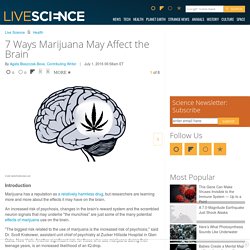
In the study, researchers stimulated the mice's appetites by manipulating the same cellular pathway as the one that mediates pot's effects on the brain, and then observed what was going on in the mice's brains during the experiment. The scientists expected that the neurons that typically suppress appetite would be turned off by their efforts to stimulate the rodents' appetites. But, contrary to their expectations, it turned out that those neurons were actually activated, because they had switched to releasing chemicals that promote hunger, study author Dr. Tamas Horvath, a professor of neurobiology at Yale University, told Live Science in a 2015 interview.
It's not clear whether it would work the same way in people, the researchers noted. Here's How Cannabis Got Its High. Sorry to break it to you, but you can't get high off hemp.
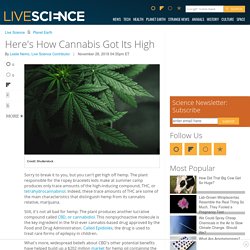
The plant responsible for the ropey bracelets kids make at summer camp produces only trace amounts of the high-inducing compound, THC, or tetrahydrocannabinol. Indeed, these trace amounts of THC are some of the main characteristics that distinguish hemp from its cannabis relative, marijuana. Still, it's not all bad for hemp: The plant produces another lucrative compound called CBD, or cannabidiol. This nonpsychoactive molecule is the key ingredient in the first-ever cannabis-based drug approved by the Food and Drug Administration. Called Epidiolex, the drug is used to treat rare forms of epilepsy in children. Canada’s Grand Cannabis Experiment Has Set Scientists Free. Enter Tilray, which, in a rare first this September, was approved by the Drug Enforcement Administration to supply cannabis extract from Canada to a California neurologist who’s developing a treatment for tremors in the elderly.
(Tilray has also built a greenhouse in a Portugal research park, expanding the science into the European Union.) America’s cannabis entrepreneurs, however, aren’t so keen on the prospective northern pot pipeline. One multistate medical grower has pleaded with President Trump for domestic regulation in a full-page Wall Street Journal ad, fretting that “America is rapidly losing its competitive advantage to Canada!” As bidding wars replace the drug war, legalization promises empirical evidence for policymakers caught between popular sensibilities and a paucity of data. Racial Justice and Legal Pot Are Colliding in Congress. CADIZ, Ky. —Congressman James Comer stood in front of a local hemp harvest stacked shin-deep for hundreds of feet in every direction, a tangled mass of bushy branches that looked more like evergreen trimmings than marijuana buds. Little yellow butterflies flitted across the surface of the crop that filled the once-vacant warehouse with the comforting smell of damp grass clippings.
It was the middle of October, and aromatic plants represented the first harvest for Vertical, a California company that has already become a serious contender in the rapidly expanding legal cannabis industry. Comer, who just won reelection to Congress with 69 percent of the vote, has promoted hemp, the non-psychoactive sister plant to marijuana, as a jobs-creating crop to replace the state’s vanished tobacco industry.
Hemp grown for CBD, a medicinal oil used for complaints from arthritis to epilepsy, fetches as much as $8,000 per acre, compared with less than $600 for the same amount of corn. What Pa. patients are treating with their medical marijuana. The Entourage Effect: How THC and Other Weed Compounds Mix. Liverwort produces a chemical almost identical to THC. Liverwort isn’t much to look at. These low-to-the-ground plant species creep along unobtrusively enough, spanning their hand-like fronds over rocks and logs alike. But there’s a secret side to some of these mossy weeds. In a report published yesterday (Oct. 24) in Science Advances, researchers revealed that certain members of the Radula genus of liverwort—there are about 9,000 species of liverwort; Radula comprises some 200-300 species—contains a chemical compound that relieves pain, much like the tetrahydrocannabinol (THC) found in marijuana.
Unlike THC, however, perrotetinene, as the compound is known, doesn’t give you a psychoactive high. Perrotetinene has a molecular structure similar to THC, which enables both compounds to easily attach to the brain’s cannabinoid receptors. In the past, it’s been easy for scientists to overlook liverwort—literally. A pair of high-profile Stanford scientists wants to use marijuana to treat an entire class of diseases where big pharma has fallen short. How good is marijuana at treating inflammation, a condition marked by swelling and redness that's also a cause of an entire class of diseases? Two high-profile Stanford researchers are about to find out. They are specifically exploring CBD, the compound in cannabis that has some medicinal properties and doesn't get you high.
On Wednesday, Jonathan Rothbard and Lawrence Steinman — both of whom have decades of experience at Stanford University Medical School and have previously founded drug companies — launched a new medical company aimed at developing CBD-based therapies for conditions like arthritis, inflammatory bowel disease, and multiple sclerosis. The common hallmark of all of those conditions is that they are inflammatory diseases, or diseases in which the body's normal protective response to external threats like infections spirals out of control. THC amounts identical in most cannabis strains, study finds. A rose by any other name is still a rose. The same, it turns out, can be said for cannabis.
Newly published research from UBC's Okanagan campus has determined that many strains of cannabis have virtually identical levels of tetrahydrocannabinol (THC) and cannabidiol (CBD), despite their unique street names. "It is estimated that there are several hundred or perhaps thousands of strains of cannabis currently being cultivated," says Professor Susan Murch, who teaches chemistry at UBC Okanagan. "We wanted to know how different they truly are, given the variety of unique and exotic names. " Cannabis breeders have historically selected strains to produce THC, CBD or both, she explains. "People have had informal breeding programs for a long time," Murch says. Calif. safety tests pass moldy marijuana but fail ~20% of products overall.
Amid opioid crisis, researchers aim to put medical marijuana to the test. Get breaking news alerts and special reports. The news and stories that matter, delivered weekday mornings. We Fact-Checked an ER Doctor Who Said Weed Edibles Can Kill Kids. Can You Get Addicted to Pot? His first attempts to reduce his use went miserably, as the consequences on his health and his life piled up. He gained nearly 40 pounds, he said, when he stopped working out and cooking his own food at home. He recognized that he was just barely getting by at work, and was continually worried about getting fired. Worse, his friends were unsympathetic to the idea that he was struggling and needed help.
“[You have to] try to convince someone that something that is hurting you is hurting you,” he said. Other people who found their use problematic or had managed to quit, none of whom wanted to use their names, described similar struggles and consequences. Consent Form. As John Mayer tells us (and tells us, and tells us), your body is a wonderland. When it comes to microbial life, this holds especially true for your gut. Untitled. Maryville — Ryan Rush's back yard in Maryville is covered with leafy plants, a greenhouse, cameras, signage to prevent a costly case of mistaken identity.
"This is not what you think it is. Marijuana legalization is having its best year ever. NPR Choice page. Lime Sorbet Cannabis Strain Information. Eu.usatoday. Everything you need to know about Massachusetts’ new marijuana rules. Dab Dosage Guide: How to Dose Cannabis Oils and Concentrates. Measuring a dab can be a daunting task to anybody who is inexperienced with cannabis concentrates. 29 Legal Medical Marijuana States and DC - Medical Marijuana - ProCon.org. Are people of color arrested more often for marijuana in New York? Cannabis Extract's Popularity Gets Ahead Of The Science : Shots - Health News.
Does medical marijuana decrease opioid use or boost it? On 4/20 Chuck Schumer To Introduce Bill To Decriminalize Marijuana. Some Republican lawmakers, once critical of marijuana, now think highly of it. Here’s why. Marijuana-based drug gets positive review from US agency. A hot shower can cure this symptom of heavy marijuana use. Association Between US State Medical Cannabis Laws and Opioid Prescribing in the Medicare Part D Population. Legal marijuana tied to drop in opioid prescriptions. Indica vs Sativa. Marijuana's Secondhand Smoke Poses Risks To Heart And Lungs : Shots - Health News. Metal Concentrations in e-Cigarette Liquid and Aerosol Samples: The Contribution of Metallic Coils. Pa. board may recommend allowing sale of flower for medical marijuana; expanding conditions to be treated.
Medical marijuana may be legal, but patients are still limited in Florida. Pa.'s first medical marijuana dispensary opens its doors. Why No Gadget Can Prove How Stoned You Are. Pennsylvania OKs first medical marijuana dispensary. 30 Montco Docs Now Approved For PA Medical Marijuana Program. Medical marijuana patients report reduction in use of prescription drugs. Marijuana Compound Helps Stop Epileptic Seizures. Harvard Study: Smoking Weed Improves Brain Functions. ChrisWeigant.com » Wyden And Blumenauer Introduce "Path to Marijuana Reform" Bills. Harvard Study: Smoking Weed Improves Brain Functions. Medical Marijuana Facility Approved in Bridgeport: Report - Norristown, PA Patch. Jeff Sessions Offers No Straight Answers On How He'll Handle Legal Marijuana. Medscape Access. Philadelphia to start with 3 medical marijuana dispensary permits. Marijuana Derivative May Curb Tough-to-Treat Epilepsy.
Marijuana may help combat substance abuse, mental health disorders. Key elements of Pa.'s new medical marijuana law. Key elements of Pa.'s new medical marijuana law. Impact of adolescent marijuana use on intelligence: Results from two longitudinal twin studies. New & Newsworthy. A New Study Questions The Link Between Teen Pot Smoking And IQ Decline. Cannabis effects on PTSD: Can smoking medical marijuana reduce symptoms?
Cannabis effects on PTSD: Can smoking medical marijuana reduce symptoms? Marijuana May Hold Promise As Treatment For PTSD. Neuropsychopharmacology - Cannabinoids Prevent the Effects of a Footshock Followed by Situational Reminders on Emotional Processing. RIA neuroscience study points to possible use of medical marijuana for depression. Medical Marijuana States See Painkiller Deaths Drop by 25% Congress quietly ends federal government's ban on medical marijuana. Marijuana extract halves seizures in children with epilepsy. Hillary Clinton, Bernie Sanders support marijuana reform, citing faulty data. Smoking extra potent 'skunk' pot causes brain damage, scientists say. Britain’s patient outlaws. Study Says Long Term Teen Marijuana Use Does Not Cause Problems Later In Life.
Pain Medicine News Mobile. Driving Under the Influence, of Marijuana. New study casts doubts on effectiveness of drug testing students. A Gift from the Gods: The History of Cannabis and Religion. Cannabis-Related Working Memory Deficits and Associated Subcortical Morphological Differences in Healthy Individuals and Schizophrenia Subjects. Courts, US public at odds over worker firings for 'legal' marijuana use.